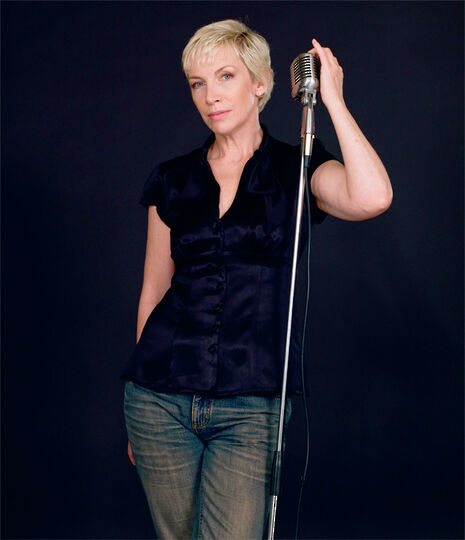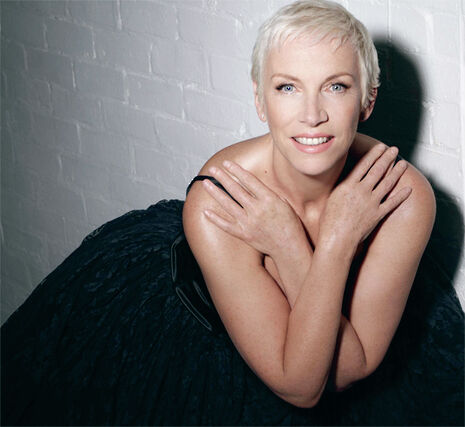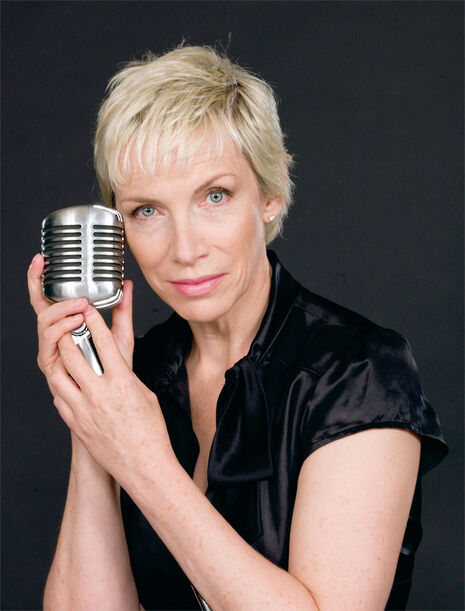Annie Lennox, n. – feminist; humanist; Eurythmic
The Big Issue’s Helena Drakakis talks to the iconic artist about her creative past and her present passions
This article originally appeared in the Big Issue

For a brief moment Annie Lennox has been transported back to Aberdeen circa 1958. “We didn’t have a bath, but we used to stand at the sink with that very hot boiler spurting out water,” she says as her Blackberry purrs in the corner. “My mother would go to the Steamie (public wash house) and she’d scrub clothes and put them through the mangle and hang everything out.”
“Everything is so different now,” she reflects, adding that although she is a “contemporary woman” her memories are “almost Edwardian”.
Lennox is 56 this year yet looks strangely timeless. The carrot coloured cropped hair of her Eurythmics days has long been replaced by peroxide blonde. Her face is softer and she exudes a worldly wisdom, yet her piercing eyes reveal a childlike wonderment at everything around her.
“These autumn days are so uplifting,” she announces in her velvety Scotch as I enter the private member’s club in Portobello.
Lennox has just released her first album in three years – a collection of Christmas carols and songs – an album she hopes is a fresh revisiting of the melodies of yesteryear.
It is also a few weeks since she won the Barclay’s Woman of the Year Award in recognition for her dedication to the causes of peace, poverty and in particular women’s struggle against HIV AIDS in Africa.
In her thank you speech she called herself a “feminist” and a “humanist”. She told an audience of 420 women that feminism was desperately needed in developing countries.

“I asked them if they identified with being a feminist, but only half the room put their hands up – what’s wrong? We need to redefine feminism. It’s crazy,” she shakes her head.
No-one could accuse Lennox of being flippant. If anything, her conversation is as absorbed as her musical career has been.
From the moment her rangy figure appeared in a tailored suit and sunglasses on Top of The Pops in 1983 she has bent the lines of gender and creatively challenged traditional notions of power.
Despite the 80 million plus records she has sold to date, she underplays her position in the lexicon of music and women’s art.
“As a creative person, you just put something out into the consciousness of the society you live in,” she explains. “You don’t know the ramifications. At the time it was just something that happened and passed. It’s only now when I meet people who saw that [performance] for the first time have I realised it’s actually been a small seed of consciousness.”
Time passing has been illuminating for Lennox. Her own teenage daughters recall the Spice Girls’ 'Wannabe' as their call to arms. But as the architect – alongside Dave Stewart – of the 1980s anthem 'Sisters Are Doing for Themselves' she laments that strength of statement may have all but evaporated.
“That was a strange thing for me. My daughters met the Spice Girls [Lennox’s former husband Uri Fruchtmann produced the girl group’s film Spiceworld]. On the one hand it was such a treat for them, but on the other I could see how besotted they were – it was a weird mania,” she says.
In almost the same breath Lennox tells me she’s just been to see The Social Network – the film about Mark Zuckerberg, the American entrepreneur and founder of Facebook.
“You must see it,” she insists. “It’s about guys that are super-bright. There is a ruthlessness coupled with young testosterone-fuelled, brilliant minds.
“Money is their goal. It’s not about the pursuit of happiness. But it’s about more than money too, it’s about building an empire.”
Lennox doesn’t say it, but I suspect her mind’s leap is a quiet assessment of the Spice Girl’s 'girl power' message which was manufactured and then taken global by Lennox’s own manager and industry titan Simon Fuller – a savvy piece of marketing as opposed to a wholly heartfelt expression.
And, although Lennox herself is worth around £35m, she professes that when she came to London from Aberdeen in 1971 to study in the Royal College of Music, money was the last thing on her mind.
“It was about creating the thing I had a passion for, but there was no guarantee. It was so risky,” she says, remembering her “paltry grant” of £140 per term and her various jobs to cover her rent.
When she dropped out to concentrate on music full-time with Peet Coombes and Dave Stewart − they formed the pre-Eurythmics band, The Tourists − she paid her way by cleaning and cooking in a friend’s house in Crouch End.

“We were all a bit renegade and there were people who came to that house and took a lot of drugs. A lot of Speed was consumed − except me because I was never the drug taker,” she laughs before adding, “neither was I purer than snow, but I was the person that made soup and went to bed while everyone else was up till six in the morning with their eyes like pinpoints.
“It was truly scuzzy and for me there were glimpses into that incredibly rough place where people get continuously out of their minds.”
As a young musician, however, Lennox never lost sight of the creative goal. The trio signed on for a year to pursue that, she recalls. “We just thought we’ve just got to go for this. No more me being a waitress. It’s got to be 24-7.”
The same instinct and passion is evident when Lennox talks about her latest album A Christmas Cornucopia – a collaboration with producer Mike Stevens. That she’s recorded a Christmas album in the first place was not calculated she stresses. She only realised Elton, Cliff, Dylan et al have all recorded seasonal albums after she made hers.
“I’m a bit naive because like most things, I get interested in what I’m doing because of the passion of the music. I wasn’t thinking, ‘Oh, it’s that time in my career where I can get a Christmas album down,’” she laughs.
Recorded in a studio at the bottom of Steven’s garden it is a project Lennox spent years thinking about, and, after her contract with Sony BMG ended she was free not to make just “pop records that go in charts”. The studio, she says, is “like a sandpit”. “I can just be myself. Ideas come thick and fast and Mike’s had to be ready to catch them – it’s like ping pong.”
As it happens, Universal got wind of it loved it. Lennox, too, describes recording the album as a “wonderful experience...reconnecting with the songs of my childhood, but from an adult perspective.”
Lennox stresses too that she has also reinterpreted the song’s religious content. “Music is the language of the soul articulated,” she says. “The inner world is very potent for me – I don’t ascribe to any God or Jesus or Buddha – I just have a sense of it and revere it along with the natural world and human consciousness.”
Lennox is also completely aware of the frailty of human life. Her humanitarian work, she admits, is connected in part to her heritage – her father was a shipbuilder and trade unionist – but is also deep-seated way of healing her own wounds.
Her first child Daniel was stillborn 22 years ago but the wound she shares today is about being an only child from a working-class neighbourhood, going to a middle class school where a different dialect was spoken. “I always had that feeling of not belonging, and I think the root of it may be in the spoken word. I had to adjust and adapt, but I was always seeking approval and a place to belong,” she says.
While Lennox works across several charities including Amnesty International and Greenpeace, it is the cause of HIV AIDS that “found me”.
It was about women and children and South Africa – a place deep in Lennox’s own consciousness. Meeting Nelson Mandela in 2003 had a profound impact on her. She had “felt wounded by Aparteid”. “It felt so freakish, so wrong. It was like a piece of grit in my shoe,” she says, adding that the Eurythmics has refused to play there while the system operated.
But HIV is the country’s post-Aparteid inheritance. “What did that mean for future generations? 1,000 people dying of AIDS related illnesses each day. So many women in a vulnerable place and not getting access to treatment,” she says.
While Lennox was one of the first “celebrity” campaigners she acknowledges that charity and celebrity can sit uncomfortably together. She refuses to criticise Madonna, for example, for adopting two children from Malawi. That wouldn’t be helpful. But she does present one caveat.
“It would be incredibly powerful if, while Madonna is adopting those children, that she could say something about the solution not lying in picking children up individually and taking them out of Africa. I’d like her to say that so much more.”
“I can’t go to Africa like some fucking white saint”, she adds, but I’ve tried to understand the dynamic and asked how I can be helpful.
“I see the burden women are carrying, and we can’t sit back and think feminism is done. It’s not done. We need to keep doing it and that’s what fuels my fire.”
 News / Cambridge postgrad re-elected as City councillor4 May 2024
News / Cambridge postgrad re-elected as City councillor4 May 2024 News / Gender attainment gap to be excluded from Cambridge access report3 May 2024
News / Gender attainment gap to be excluded from Cambridge access report3 May 2024 News / Some supervisors’ effective pay rate £3 below living wage, new report finds5 May 2024
News / Some supervisors’ effective pay rate £3 below living wage, new report finds5 May 2024 Comment / Accepting black people into Cambridge is not an act of discrimination3 May 2024
Comment / Accepting black people into Cambridge is not an act of discrimination3 May 2024 News / Academics call for Cambridge to drop investigation into ‘race realist’ fellow2 May 2024
News / Academics call for Cambridge to drop investigation into ‘race realist’ fellow2 May 2024




